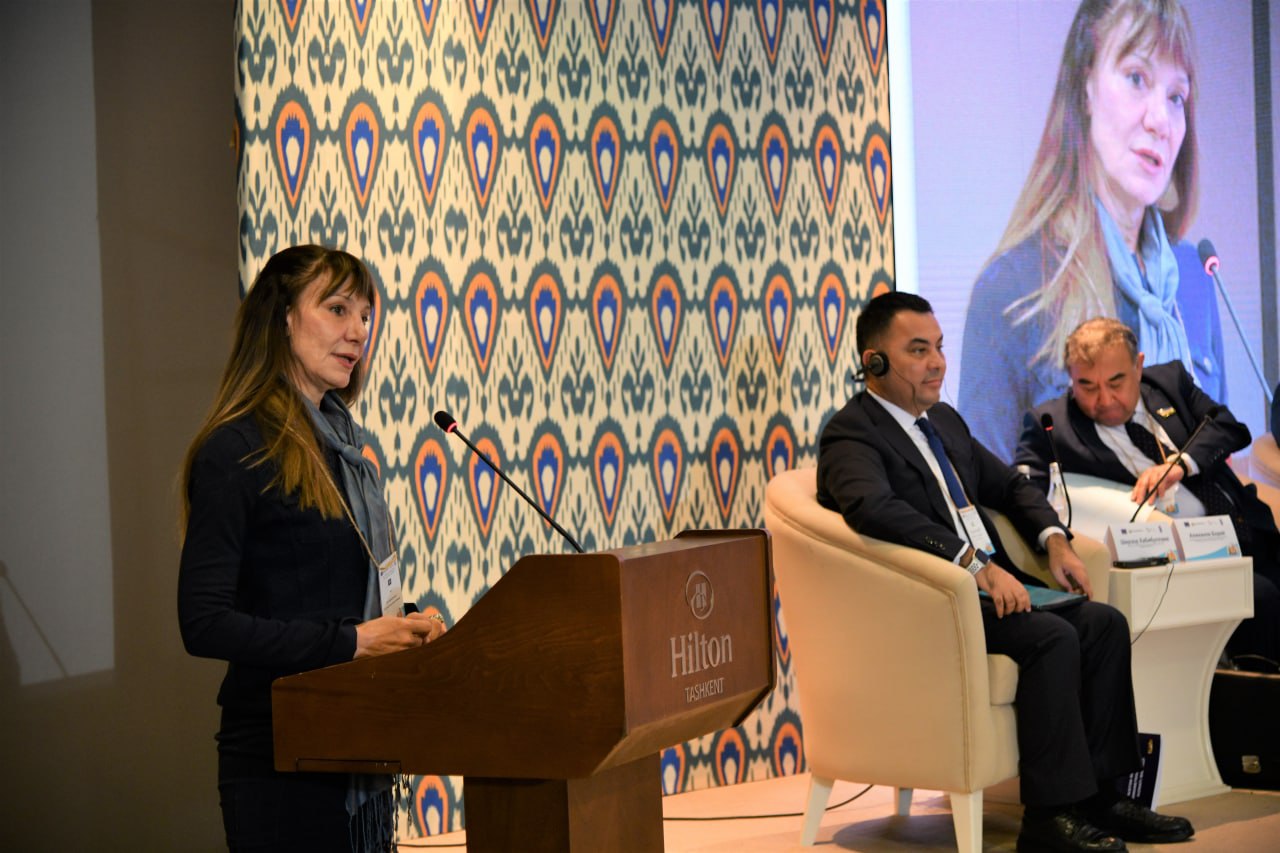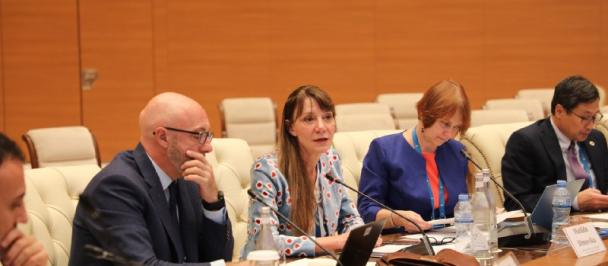Opening Statement by Matilda Dimovska, UNDP Resident Representative in Uzbekistan at the High-Level Central Asian Dialogue on Climate Change and Resilience
December 2, 2022

Hurmatli anjuman ishtirokchilari, xonimlar va janoblar, Assalomu aleykum!
Distinguished Delegates, Ladies, and Gentlemen,
Welcome to our guests and partners from Kazakhstan, Kyrgyz Republic, Tajikistan, Turkmenistan, and Uzbekistan.
On behalf of UNDP, I would like to extend the gratitude to the Government of Uzbekistan (particularly the Center of Hydrometeorological Service) for organizing this High-Level Central Asian Dialogue on Climate Change and Resilience.
Big thank you to its key supporter – the EU, as well as its co-organizers - GIZ and the Center of Hydrometeorological Service of Uzbekistan.
The motto that we gather around is ‘From global knowledge to local solutions: climate resilient institutions in Central Asia’.
We gather as we clearly understand that the existential problem of the world today - the climate change - does not recognize borders. If it is to be addressed, policies and actions shall be taken locally, but also regionally and globally. Only with a well synchronized action there is a chance to address this most pressing problem the world is facing today.
Therefore, only few weeks ago, we carefully watched what is happening at the Climate Change Conference COP27. As we know that in this world of wars, crises and fragmentation, we must come together to find concrete solutions to the global climate emergency. It was a call for ambition and acceleration, to put us back on track to close the gaps: on cutting emissions, boosting climate resilience and adaptation and climate finance and on addressing loss and damage. And clear message that to keep the 1.5-degree ambition, massive investment is needed.
All ambitions may not have been met, but the agreement of nearly 200 nations to establish the long overdue Fund to assist developing countries address loss and damage from the adverse impacts of climate change was seen as a signal of hope for the humanity and the planet.
We are in Central Asia, a region that is warming faster that the global average. The Central Asian countries do share huge historical and cultural wealth, but also the acute vulnerability to climate change because of the region’s geographic and socioeconomic conditions. We are all alerted when we hear about yet another extreme weather event in the neighboring country, as we know it may come to us as well. And that the costs and impact of any disaster will spread and not spear the neighbors. Aral Sea is the hotspot of CA, the direct threat to the region's sustainable development, health, and future of the people.
Therefore, Central Asian counties actively participated at COP27, tabled commitment and pledge to meet their Paris Agreement obligations. This is backed up with national policies on climate change mitigation and adaptation and national priority goals on environment, climate change and disaster risk management.
This political commitment was confirmed during the recent 4th Consultative Meeting of the Heads of Central Asian States, whereby the agreed "Green Agenda" for CA signalled interest for stronger regional cooperation on climate change, rational use of water and energy resources and prioritization of regional initiatives to address the most urgent environmental issues in the region.
The economic, if not the human, case for joint action is very clear: the cost of inaction or delayed investments is much higher than the cost of strengthening the resilience to climate change now. According to the WB estimates, if no action is taken, economic damages from droughts and floods in CA are projected to be up to 1.3% of GDP per annum, crop yields are to decrease by 30% by 2050, leading to around 5.1 million internal climate migrants by that time.
Which leads to our key theme - regional cooperation to boost the climate resilience in Central Asia. There are several actions that needs to be jointly taken if the barriers to climate resilience are to be tackled:
First, increase of dialolgue, knowledge base, information exchange and communication on climate-fragility risks and hot-spots between the countries which share limited natural resources. And particularly in Fergana Valley - the highest climate change risk area among transboundary climate change hotspots in Central Asia. This would require very close joint work not only among the Gov’t institutions, but also the Civil Society as well as invovement of all groups - younger or older, female or male, leaving with or without disabilities. So that the dialogue is kept productive and the knowledge, data, and methodologies that can inform climate adaptation/mitigation practices and policies across the region is generated and shared.
Second, balance between mitigation and adaptation action at regional level: most of the countries are developing or have National Adaptation Plans for the most climate vulnerable sectors including agriculture, water, health, emergency, and buildings. The National Adaptation Plans would have better contribution, if also informed and syncrozined at regional level. Similar is for the mitigation measures, particularly for the most critical ones.
Third, reflection of the current and emerging global and regional trends into a joint action: Any investment has to be climate resilient and to result in environmentally friendly solutions. In the current world that also means making sure that investments benefit from digital technologies. This implies promoting SMART solutions, including on ealry warning systems, specifically for vulnerable groups. But also - climate-resilient and energy efficient solutions, at community level and up to regional level.
Given the transboundary nature of climate risks and shared natural resources, joining actions towards the climate action is necessary and has a great potential for the resilient development of Central Asia.
This event is organized to contribute to regional cooperation around climate resilience of Central Asia. We hope it will evolve into a comprehensive climate change-related dialogue and exchange among the Central Asian states as well as that it will contribute to development of a long-term vision for building resilience against climate change and natural disasters, by taking holistic climate actions together.
UNDP is grateful for your participation and is ready to continue supporting partnerships around this topic.

 Locations
Locations
